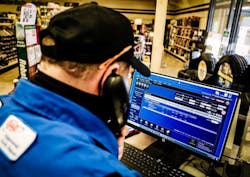Are You Prepared for a Ransomware Attack? How to Shore Up Your Defenses
Ransomware attacks are back in the news and they have the ability to severely disrupt your dealership. In fact, ransomware attacks “can bring your business to a grinding halt,” says Jay Adams, president of MaddenCo Inc.
Last week, a massive ransomware attack struck more than 1,000 businesses throughout North America, Europe and Asia.
The assault - which some are calling the largest ransomware attack to date - followed on the heels of a ransomware strike in May that led to the temporary shutdown of the Colonial Pipeline, which supplies the East Coast of the United States with at least 50% of its oil. (Click here to read MTD’s report about the shutdown’s impact on tire dealers.)
“The organizations that perpetrate this type of activity have gotten more sophisticated - and so have the demands of these organizations,” says Adams.
The group that took credit for last week’s ransomware attack is demanding $70 million in cryptocurrency, according to reports.
“I would also note that there are now more opportunities to attack sensitive data, given all of our devices that are networked.”
The best defense
Jared Bailey, head of TireMaster operations for ASA Automotive Systems Inc., says the best way for tire dealers to defend against ransomware attacks “is to be proactive in their security approach. You don’t have to be a tech wizard to keep your system safe. Just ensure you do these things:”
Install anti-virus/malware software. “Having anti-virus software is a must to prevent your system from getting infected,” says Bailey. “Don’t compromise on the anti-virus software based on its price,” which he says “will be dwarfed by the cost to remove a virus and the man-hours required to restore your lost data.”
Ensure your connections are secure. Bailey recommends using an internet browser with the latest security protocols - such as Chrome or Firefox - when web surfing. “And make sure all the websites you visit are secure.” Secure websites, he explains, “will always begin with https://. The ‘s’ is critical. Websites beginning with just http:// are not secure.”
Keep your system up-to-date. “Whenever your operating system, point-of-sale system or accounting software tells you it’s time to make an update, do it. Systems with the most up-to-date software are less vulnerable to malware, ransomware and crypto-viruses.”
Don’t open emails or click on attachments from unknown senders. “If you receive an email that looks suspicious, the safest option is to just delete it without even opening or downloading attachments,” says Bailey. “Hopefully, your spam filters will catch any phishing emails before you even see them. But make sure to always check the sender’s address - especially on emails requesting personal information or passwords. These messages are almost always phishing emails.”
Use cloud back-up. “While you can do your best to protect your data and systems from ransomware, there is never a 100% guarantee. It is therefore critical to be prepared and keep your business data safe by using cloud back-up.”
Bailey notes that ASA is working with tire dealers “to help them keep their data safe on the cloud” and also works with data recovery specialists to provide high levels of encryption and security, while ensuring full data recovery in the event of a cyber-attack.
‘Must be addressed’
Ransomware attacks “are a definite problem that must be addressed by businesses and that includes tire dealerships,” notes MaddenCo’s Adams.
“In many cases, tire dealerships are smaller businesses that may not have the time or scale to adequately protect against ransomware, so there can be some vulnerability for that reason."
Click here to read a 2017 MTD article about a tire dealer whose business was the victim of a ransomware attack. "It's nothing you want to re-live," he told MTD.